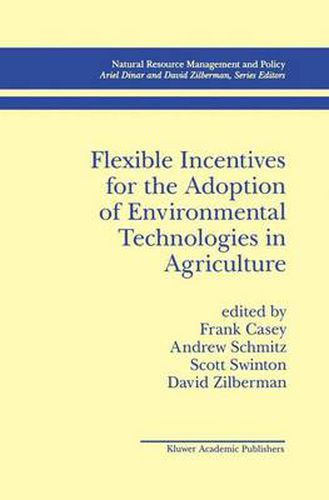Readings Newsletter
Become a Readings Member to make your shopping experience even easier.
Sign in or sign up for free!
You’re not far away from qualifying for FREE standard shipping within Australia
You’ve qualified for FREE standard shipping within Australia
The cart is loading…






This title is printed to order. This book may have been self-published. If so, we cannot guarantee the quality of the content. In the main most books will have gone through the editing process however some may not. We therefore suggest that you be aware of this before ordering this book. If in doubt check either the author or publisher’s details as we are unable to accept any returns unless they are faulty. Please contact us if you have any questions.
This text identifies and structures flexible economic incentives for the achievement of environmental goals in agriculture. It provides a conceptual framework and presents case studies that analyze how flexible incentives can address environmental problems that are caused by agricultural production. The book brings together economists, agency personnel and political economists for the purpose of exploring how new cutting-edge economic tools could be developed and applied to environmental problems. The goal of the book is to complement and to expand the economic theory of environmental regulation and technology adoption with new research findings. The key theme of this book is the important role technology takes when addressing environmental problems. New technologies and technical development are broadly defined to include economic instruments, innovative ways to commumicate environmental information, new economic institutions, and education. This book is designed for public and private policymakers, government analysts, teachers, researchers and students who specialize in the fields of natural resources, agricultural economics and environmental regulation. It provides a fresh perspective on what types of incentives may be used to lead us to the desired environmental outcomes and offers new ideas about the types of economic instruments that may achieve these outcomes.
$9.00 standard shipping within Australia
FREE standard shipping within Australia for orders over $100.00
Express & International shipping calculated at checkout
This title is printed to order. This book may have been self-published. If so, we cannot guarantee the quality of the content. In the main most books will have gone through the editing process however some may not. We therefore suggest that you be aware of this before ordering this book. If in doubt check either the author or publisher’s details as we are unable to accept any returns unless they are faulty. Please contact us if you have any questions.
This text identifies and structures flexible economic incentives for the achievement of environmental goals in agriculture. It provides a conceptual framework and presents case studies that analyze how flexible incentives can address environmental problems that are caused by agricultural production. The book brings together economists, agency personnel and political economists for the purpose of exploring how new cutting-edge economic tools could be developed and applied to environmental problems. The goal of the book is to complement and to expand the economic theory of environmental regulation and technology adoption with new research findings. The key theme of this book is the important role technology takes when addressing environmental problems. New technologies and technical development are broadly defined to include economic instruments, innovative ways to commumicate environmental information, new economic institutions, and education. This book is designed for public and private policymakers, government analysts, teachers, researchers and students who specialize in the fields of natural resources, agricultural economics and environmental regulation. It provides a fresh perspective on what types of incentives may be used to lead us to the desired environmental outcomes and offers new ideas about the types of economic instruments that may achieve these outcomes.